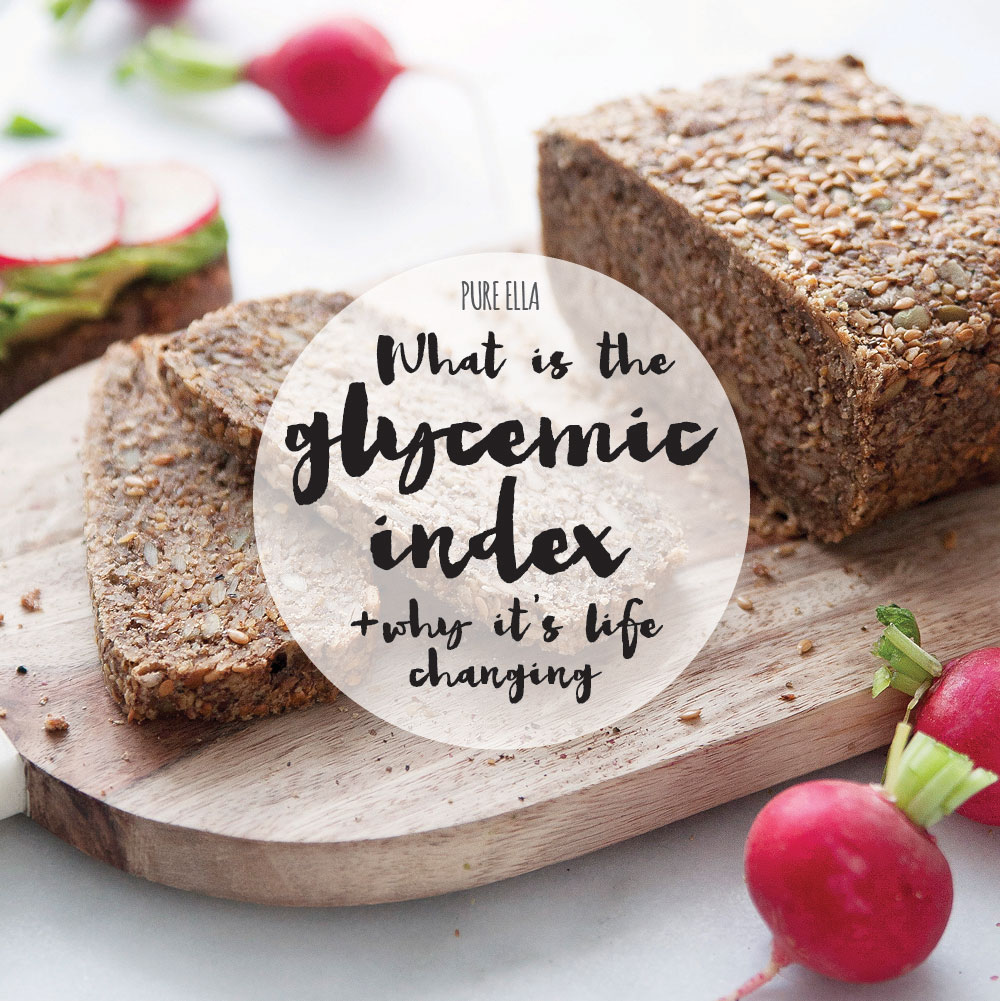
What is the Glycemic Index? Have you heard of this term before? Do you follow a GI diet plan?
I’m not a diet fanatic BUT I have healed myself from about 20 different conditions that debilitated my health to the point I could barely walk… and I often get questions about what I did and if I could share my healing strategies and secret game plans that can help people overcome numerous ailments…
I often mention the Glycemic Index diet on the occasional post or I share a recipe with a low-glycemic sweetener or ingredient and I have mentioned it in my book Cut the Sugar and I feel like this topic deserves a bit of importance on its own because it really IS life changing!
So, in a nutshell, this is what the Glycemic Index is + why it’s life changing (really!):
What is the Glycemic Index :
The glycemic index measures the effects of carbohydrates on your blood sugar after you eat a meal. Foods that are high on the glycemic index (GI) can cause your blood sugar to spike. This can lead to sugar spikes and drops. This can also cause your insulin levels to soar in a short period of time which could lead to diabetes over time.
That’s why it’s important to be mindful of the Glycemic Index when you want to improve your health and want to eat better overall.
Low-Glycemic foods – good for you
- control your blood glucose level
- control your cholesterol level
- control appetite
- lower risk of developing heart disease
- lower risk of developing Type II Diabetes
- These foods are metabolized by the body slowly, thus not spiking your blood sugar high and you also feel satiated, fuller longer, avoiding a low blood sugar crash.
High-Glycemic foods – bad for you
- these foods spike the blood sugar way high
- a lot of these foods are high-fructose foods
- these foods strain the pancreas and liver
- these foods also contribute to blood sugar spikes and crashes
One of the best health changes you can make is to shift your focus on incorporating more low-glycemic foods into your diet. This ‘diet’ would naturally avoid foods like soft-drinks, juice, sugary foods, potato chips, french fries, white rice, white bread/ bagels etc. These foods are not good for you anyway, right? And you would naturally incorporate more foods that are low-glycemic, that digest slowly and keep your blood sugar stable.
This is essentially the diet I am on for the most part. Occasionally I do eat some higher-glycemic foods but really rarely. When I replaced grains and other carbs to low-glycemic foods – my health improved and I have since gotten rid of so many health issues such as: anxiety, depression, insomnia, panic attacks, headaches, food intolerances, digestive issues, bloating, hormonal issues, mood swings, emotional eating, food allergies, seasonal allergies, difficulty focusing, foggy brain and so much more + severe muscle weakness due to a neuromuscular autoimmune illness.
Why is a Low-Glycemic Diet life changing:
So when you eat high-glycemic foods, eg. white pasta or drink pop, your blood sugar quickly spikes. You get a boost of energy BUT this ‘sugar high’ as we usually call it, will NOT last. As your blood sugar drops you will start to feel lethargic, often agitated, and your patience level will get affected. You will usually feel hungrier within a much shorter time frame than if you would eat a low-glycemic meal. AND you will crave more high-glycemic foods – sweet foods or starchy foods like pasta, french fries or potato chips will be on your mind and usually (because sugar is so powerful) (FYI all carbohydrates are sugar) you will eat more high-glycemic foods… and this will keep going in circles and keep messing up you health and wellbeing. It’s what high-glycemic foods do – they mess up your health and wellbeing.
If you choose low-glycemic foods, eg. darker grains like buckwheat, quinoa, brown rice or wild rice and avoid pop and juice and other sweets, these carbohydrates will digest slowly into the bloodstream, you won’t have that sugar high and your mood and hunger will remain stable. If you keep eating this way regularly and avoid skipping meals, your whole body will thank you and you will feel amazing and healthy.
How to make healthier Low-Glycemic swaps in your kitchen:
So a lot of these foods exchanges would look like this :
- dense bread especially with seeds and whole grains vs. white bread
- sweet potatoes vs. white potatoes
- brown rice, quinoa, buckwheat, wild rice vs. white rice
- coconut palm sugar vs. white sugar
- Non-starchy vegetables are mostly all low-glycemic – eat those without restrictions!
- Some fruit ranks low some ranks high on the glycemic index scale. But when it comes to fruit (unless you’re a fruitarian) it’s not really a huge issue. Fruit provides your body with lots of vitamins and minerals so you don’t have to restrict eating fresh fruit – it’s a great sweet treat, enjoy! :)
Do tell: How does your diet (as in eating habits) compare to a Glycemic Index diet plan. Do you mostly eat high-glycemic foods or low-glycemic foods?
.
 Ella Leché is a cookbook author (‘Cut the Sugar‘), recipe developer, and photographer/stylist behind Pure Ella; where she shares delicious and healthy recipes. Eating PURE is clean ingredients, whole foods, plant-based nourishment and delicious desserts – with quality ingredients and sweeteners so they’re treats with benefits so you won’t have to feel deprived or restricted to eat healthier.
Ella Leché is a cookbook author (‘Cut the Sugar‘), recipe developer, and photographer/stylist behind Pure Ella; where she shares delicious and healthy recipes. Eating PURE is clean ingredients, whole foods, plant-based nourishment and delicious desserts – with quality ingredients and sweeteners so they’re treats with benefits so you won’t have to feel deprived or restricted to eat healthier.Thank YOU for being here!
Follow on social media for daily health & happiness inspiration:
Instagram | Facebook | Pinterest | Twitter
 ps. don’t forget to share your Pure Ella (PE) recipe creations by tagging them #pureella and @pure_ella on Instagram – we repost our favourite photos!
ps. don’t forget to share your Pure Ella (PE) recipe creations by tagging them #pureella and @pure_ella on Instagram – we repost our favourite photos!
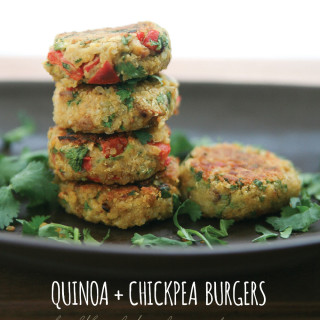
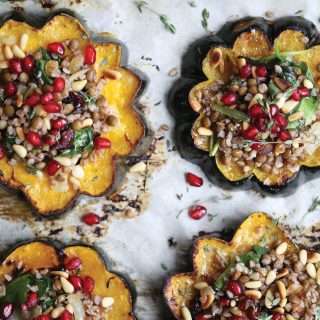
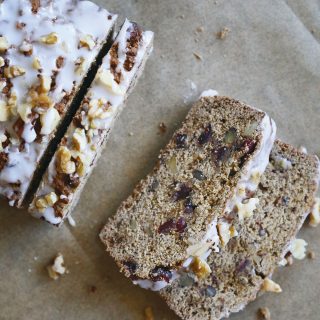


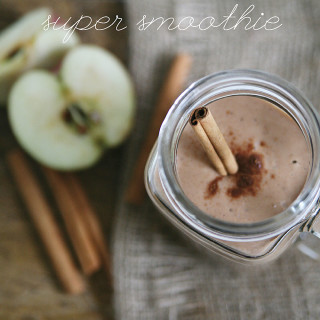
great post Ella!! thank you!
Hi Ella,
Thank you for sharing this, It’s really cool what you’re doing with Cut the Sugar and this post, bringing a little more awareness to the importance of what really is a whole foods way of eating (I don’t like the word diet much, it quickly leads to restriction..).
I have two remarks to your suggestions though:
1- sweet potatoes vs white potatoes : instead of banning potatoes, which are a unprocessed food (unlike white rice and white bread), I’d suggest consuming them cold, which lowers their GI (in moderation, of course).
2- Coconut palm sugar vs white sugar : this is a tricky one. Is Coconut palm sugar really better than unrefined cane sugar? With all things sweet moderation is really what we’re looking for.
But what really bothers me with this recommendation is the unsustainability of the coconut palm sugar industry.
Please see this article for more info: https://www.tropicaltraditions.com/coconut_palm_sugar.htm
Cheers!
Silvia